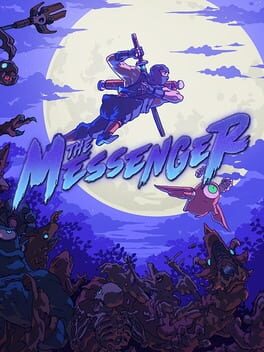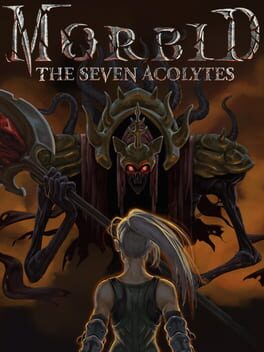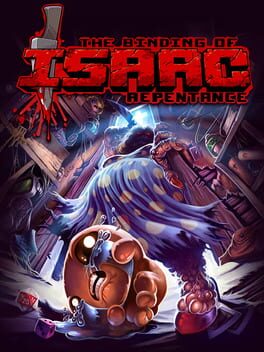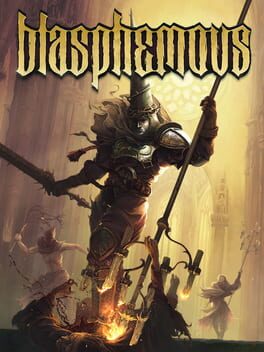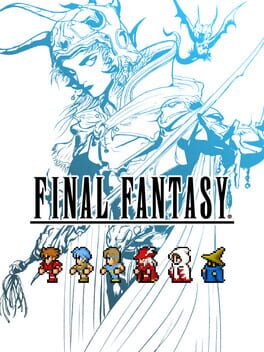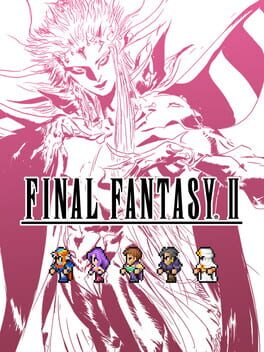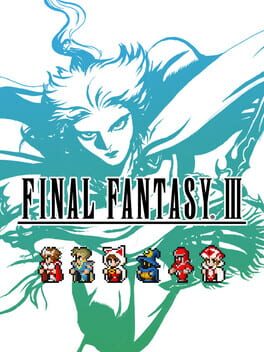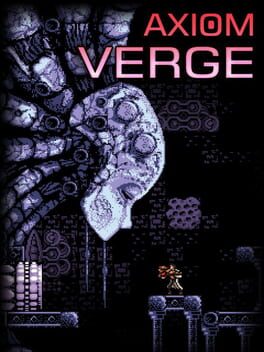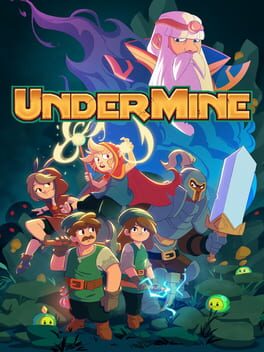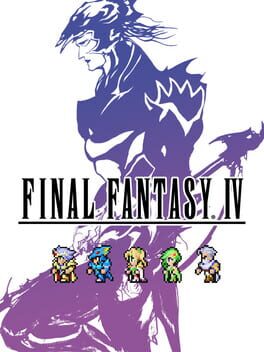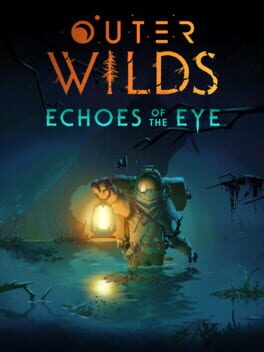AlexTheGerman
2018
A good game with major flaws. The controls and look are perfect. The first part is much better than the second. The backtracking due to the missing fast travel system is exhausting. The soundtrack gets grating after a while. The dialogue is perhaps a bit too smart for its own good.
Play it, but don't replay it.
Play it, but don't replay it.
Without doubt one of the best games ever made.
Although the incredibly random nature combined with the increased difficulty of the complete Repentance version is tough to master, this is really one of those games that will make you question whether you should play any other games.
And the answer, at least for hundreds of hours, is no.
Although the incredibly random nature combined with the increased difficulty of the complete Repentance version is tough to master, this is really one of those games that will make you question whether you should play any other games.
And the answer, at least for hundreds of hours, is no.
2019
2021
Pros:
- A genre milestone with lots of historic value
- Lovingly recreated in the Pixel Remaster versions with great soundtrack and visuals (except for the font and weird screen tearing)
- A map and autosave function that will eliminate most of the frustration
Cons:
- Has aged incredibly badly (even with the bug fixes and modern improvements)
- Barebone, unbalanced combat system with no strategic finesse and often random outcomes
- Awful dungeon designs that punish wrong decisions with more grinding
- Weak story with even weaker dialogue
- Useless classes and faceless avatars
- Laughable pacing that lets you traverse directionless by boat after roughly the first half hour
Magic Moment: When you realize that the entire series started as a DnD game with dwarves. Oh, and the first boat ride!
Verdict: Play for the historic value if you have a little time to spare. Don't replay.
- A genre milestone with lots of historic value
- Lovingly recreated in the Pixel Remaster versions with great soundtrack and visuals (except for the font and weird screen tearing)
- A map and autosave function that will eliminate most of the frustration
Cons:
- Has aged incredibly badly (even with the bug fixes and modern improvements)
- Barebone, unbalanced combat system with no strategic finesse and often random outcomes
- Awful dungeon designs that punish wrong decisions with more grinding
- Weak story with even weaker dialogue
- Useless classes and faceless avatars
- Laughable pacing that lets you traverse directionless by boat after roughly the first half hour
Magic Moment: When you realize that the entire series started as a DnD game with dwarves. Oh, and the first boat ride!
Verdict: Play for the historic value if you have a little time to spare. Don't replay.
2021
Pros:
- Another milestone with lots of historic value, especially in terms of its connection to the SaGa series
- Lovingly recreated in the Pixel Remaster versions with great soundtrack and visuals (except for the font and weird screen tearing)
- A map and autosave function that will eliminate most of the frustration
- An actual quest with actual characters and a distinct dramatic quality
- A leveling system that was daring for its time and still has many interesting ideas
- Secrets and side quests that make the world feel alive and reward players' curiosity
- An actual open world that introduces Chocobos to the series
Cons:
- Mostly opaque leveling system that never becomes any clearer throughout the game, with apparently random damage rolls that render strategic battles impossible
- Awful dungeon designs that bait players with empty rooms and punish their curiosity with random encounters
- Beginner's loot and items even in the final dungeon
- Higher encounter rate than in FFI that will either bore the hell out of you or make you scream in anger
- The incredibly disappointing quest for finding Ultima
- A final boss fight that is so badly designed that it becomes practically impossible if your party is developed with physical attacks in mind. Seriously, without one particular MISSABLE weapon, it becomes a huge chore and epitomizes all grievances directed at the game throughout the decades
Magic Moment: The first meeting with series mascot Cid and the Chocobo.
Verdict: Not recommended for newcomers, even veterans should probably skip this one. Longer and tougher than FFI, but not as rewarding. Certainly don't replay.
- Another milestone with lots of historic value, especially in terms of its connection to the SaGa series
- Lovingly recreated in the Pixel Remaster versions with great soundtrack and visuals (except for the font and weird screen tearing)
- A map and autosave function that will eliminate most of the frustration
- An actual quest with actual characters and a distinct dramatic quality
- A leveling system that was daring for its time and still has many interesting ideas
- Secrets and side quests that make the world feel alive and reward players' curiosity
- An actual open world that introduces Chocobos to the series
Cons:
- Mostly opaque leveling system that never becomes any clearer throughout the game, with apparently random damage rolls that render strategic battles impossible
- Awful dungeon designs that bait players with empty rooms and punish their curiosity with random encounters
- Beginner's loot and items even in the final dungeon
- Higher encounter rate than in FFI that will either bore the hell out of you or make you scream in anger
- The incredibly disappointing quest for finding Ultima
- A final boss fight that is so badly designed that it becomes practically impossible if your party is developed with physical attacks in mind. Seriously, without one particular MISSABLE weapon, it becomes a huge chore and epitomizes all grievances directed at the game throughout the decades
Magic Moment: The first meeting with series mascot Cid and the Chocobo.
Verdict: Not recommended for newcomers, even veterans should probably skip this one. Longer and tougher than FFI, but not as rewarding. Certainly don't replay.
2021
Pros:
- A classic game with great influence on the series as a whole
- Lovingly recreated in the Pixel Remaster versions with great soundtrack and visuals (except for the font and weird screen tearing)
- A map and autosave function that will eliminate most of the frustration
- Shorter, more interesting dungeons and a managable encounter rate
- A new job system that is unique and implemented best here out of all the versions of FFIII
- Secret summons and side quests that make the world feel alive and reward players' curiosity
- An actual open world with many distinct ways of traversal
Cons:
- A convoluted, forgettable story with bland characters and easy solutions (which is a step back compared to the dramatic quality of FFII)
- Opague damage rolls and an apparently random turn order render strategic battles impossible
- An unbalanced job system that is rarely relevant to the game at large
- An incredibly high difficulty throughout the game, in particular towards the final dungeons. Be prepared to grind!
Magic Moment: When you realize how large the world map actually is. Oh, and the Fat Chocobo theme.
Verdict: The job system and manifold secrets make this one worth playing, even though this is probably the toughest and longest FF from the 8-Bit generation. Fans should take a look at this one, but one playthrough is enough.
- A classic game with great influence on the series as a whole
- Lovingly recreated in the Pixel Remaster versions with great soundtrack and visuals (except for the font and weird screen tearing)
- A map and autosave function that will eliminate most of the frustration
- Shorter, more interesting dungeons and a managable encounter rate
- A new job system that is unique and implemented best here out of all the versions of FFIII
- Secret summons and side quests that make the world feel alive and reward players' curiosity
- An actual open world with many distinct ways of traversal
Cons:
- A convoluted, forgettable story with bland characters and easy solutions (which is a step back compared to the dramatic quality of FFII)
- Opague damage rolls and an apparently random turn order render strategic battles impossible
- An unbalanced job system that is rarely relevant to the game at large
- An incredibly high difficulty throughout the game, in particular towards the final dungeons. Be prepared to grind!
Magic Moment: When you realize how large the world map actually is. Oh, and the Fat Chocobo theme.
Verdict: The job system and manifold secrets make this one worth playing, even though this is probably the toughest and longest FF from the 8-Bit generation. Fans should take a look at this one, but one playthrough is enough.
2015
Pro:
- A cohesive, believable world created by only one person
- The distinct and recognizable art style
- Functional shooting mechanics and fun boss fights
- Well-implemented save points and save system
- Fresh ideas for map traversal and power ups (compared to other Metroidvanias)
- A surprisingly complex plot with tasteful cutscenes ...
Contra:
- ... that is mostly implemented with endless, boring dialogue
- Most weapons are useless and weak compared to the starting gun
- No autofire!
- Clumsily implemented dodge and drone mechanics
- Frustrating difficulty spike towards the final third
- A barely useful map with only 2 markers and no guidance system
- No warp system means endless backtracking
- Content locked behind random pickups and opaque password system
- Grading musical themes without character
- 10 hours playtime feels like twice as much
Magic Moment: When the tedious final fight just kind of ends without fanfareand gives way to a deep feeling of never having to play this again.
Verdict:
Somehow, Axiom Verge has become something of a classic Metroidvania over the last few years. I played though this again to prepare for its sequel and found it to be boring, difficult and simply unfun.
Don't play it, there are loads and loads of better Metroidvanias these days ... I will certainly never replay this.
- A cohesive, believable world created by only one person
- The distinct and recognizable art style
- Functional shooting mechanics and fun boss fights
- Well-implemented save points and save system
- Fresh ideas for map traversal and power ups (compared to other Metroidvanias)
- A surprisingly complex plot with tasteful cutscenes ...
Contra:
- ... that is mostly implemented with endless, boring dialogue
- Most weapons are useless and weak compared to the starting gun
- No autofire!
- Clumsily implemented dodge and drone mechanics
- Frustrating difficulty spike towards the final third
- A barely useful map with only 2 markers and no guidance system
- No warp system means endless backtracking
- Content locked behind random pickups and opaque password system
- Grading musical themes without character
- 10 hours playtime feels like twice as much
Magic Moment: When the tedious final fight just kind of ends without fanfareand gives way to a deep feeling of never having to play this again.
Verdict:
Somehow, Axiom Verge has become something of a classic Metroidvania over the last few years. I played though this again to prepare for its sequel and found it to be boring, difficult and simply unfun.
Don't play it, there are loads and loads of better Metroidvanias these days ... I will certainly never replay this.
2020
Pros:
- Cute, unique art style and character design
Cons:
- No narrative elements
- No functional tutorial
- No quick restart from menu
- Sound effects cannot be turned completely off
- Barely functional double jump mechanics
- Inconsistent level design
- Checkpoints don't save collectibles
- High difficulty with very little playoff
Manic Moment: Level 9 starts with a challenge that is impossible to overcome if you don't understand an important mechanic that the game never teaches.
Verdict: A hyper-difficult platformer with nice visuals but very little polish and quality. Don't play, especially when there are so many better competitors.
- Cute, unique art style and character design
Cons:
- No narrative elements
- No functional tutorial
- No quick restart from menu
- Sound effects cannot be turned completely off
- Barely functional double jump mechanics
- Inconsistent level design
- Checkpoints don't save collectibles
- High difficulty with very little playoff
Manic Moment: Level 9 starts with a challenge that is impossible to overcome if you don't understand an important mechanic that the game never teaches.
Verdict: A hyper-difficult platformer with nice visuals but very little polish and quality. Don't play, especially when there are so many better competitors.
2020
Pro:
- lots of content
- nice art style and charismatic character designs
- funny dialogue and cute interactions
- unique combination of close and ranged combat
- inventive curse and blessing system
Contra:
- lack of an in-depth ingame tutorial
- close combat is sometimes tough to navigate
- jump mechanics are sluggish and sometimes unresponsive
- no information about the map creation algorythms and secrets ingame
- central gaming loop never really evolves
- too hard in the beginning, too easy towards the end
- badly designed final boss (that punishes you for playing the game in a particular way)
Magic Moment: Finding out that just getting to end of the dungeon is not the actual end of the game - which can be a negative and a positive, depending on your style of play.
Verdict: In the era of frequent, high quality Roguelikes, Undermine is a good but not great addition to the genre. The central gameplay loop is not particularly satisfactory and the difficulty scale is sadly off, put the curse system is inventive and there is lots of content to be discovered. You should perhaps take a look at it, but one playthrough is certainly enough.
- lots of content
- nice art style and charismatic character designs
- funny dialogue and cute interactions
- unique combination of close and ranged combat
- inventive curse and blessing system
Contra:
- lack of an in-depth ingame tutorial
- close combat is sometimes tough to navigate
- jump mechanics are sluggish and sometimes unresponsive
- no information about the map creation algorythms and secrets ingame
- central gaming loop never really evolves
- too hard in the beginning, too easy towards the end
- badly designed final boss (that punishes you for playing the game in a particular way)
Magic Moment: Finding out that just getting to end of the dungeon is not the actual end of the game - which can be a negative and a positive, depending on your style of play.
Verdict: In the era of frequent, high quality Roguelikes, Undermine is a good but not great addition to the genre. The central gameplay loop is not particularly satisfactory and the difficulty scale is sadly off, put the curse system is inventive and there is lots of content to be discovered. You should perhaps take a look at it, but one playthrough is certainly enough.
2021
Pros:
- a classic game with possible the biggest influence on the series as a whole
- lovingly recreated in this remastered version with great soundtrack and visual quality
- a detailed map and autosave function
- introduction and perfect implementation of the Active Time Battle system
- rich, huge overworld with a distinctly modern feel
- satisfactory, smooth difficulty curve
- short dungeons and a manageable encounter rate
- some of the best characters story arcs in the series to far...
Cons:
-... and some truly annoying and useless ones (looking at you, magic twins)
- the plot is not developed to its actual conclusion and leaves some threads dangling
- surprise attacks are common and drag down the pacing
- some action commands are practically useless (Steal, Pray...)
- the infamous hunt for summoning items with ridiculously low encounter chances
- limited, repetitive soundtrack with the weakest battle theme of the series thus far
- a short and underwhelming final fight
Magic Moment: Rydias character development and surprise appearance at a dramatic moment of the story.
Verdict: This is a true classic. A Final Fantasy game that influenced the series for years to come and showed the world what the future of JRPG would feel like. This particular version makes it easily accessible and is presented wonderfully.
Highly recommended.
- a classic game with possible the biggest influence on the series as a whole
- lovingly recreated in this remastered version with great soundtrack and visual quality
- a detailed map and autosave function
- introduction and perfect implementation of the Active Time Battle system
- rich, huge overworld with a distinctly modern feel
- satisfactory, smooth difficulty curve
- short dungeons and a manageable encounter rate
- some of the best characters story arcs in the series to far...
Cons:
-... and some truly annoying and useless ones (looking at you, magic twins)
- the plot is not developed to its actual conclusion and leaves some threads dangling
- surprise attacks are common and drag down the pacing
- some action commands are practically useless (Steal, Pray...)
- the infamous hunt for summoning items with ridiculously low encounter chances
- limited, repetitive soundtrack with the weakest battle theme of the series thus far
- a short and underwhelming final fight
Magic Moment: Rydias character development and surprise appearance at a dramatic moment of the story.
Verdict: This is a true classic. A Final Fantasy game that influenced the series for years to come and showed the world what the future of JRPG would feel like. This particular version makes it easily accessible and is presented wonderfully.
Highly recommended.
2018
Pros:
- deep integration of gameplay, setting, music and story
- artistic elements such as the art and voiceovers are of exceptionally high quality
- great character designs and diverse dating options
- outstanding soundtrack and vocal tracks by Ashley Barrett
- fast paced, responsive moment to moment action gameplay
- practically endless replayability and accompanying dialogue
Cons:
- starting weapon is the weakest and least versatile
- small amount of weapons and upgrades
- very limited number of biomes and enemies
- opaque boon progression and combination system
- very limited number of bosses for a roquelike
- steep difficulty progression in the beginning...
- ...until you have finished your first run
- limited number of surprises after the True Ending (which can be accomplished pretty quickly)
- the reason for the restart of the loop is a bit too convenient before the True Ending (and a bit silly afterwards)
- maxing out large amount of collectables gets overwhelming
- Nectar is too rare for its importance and its trade sequence is too expensive
- Hades voice is a bit overdone
Magic Moment: The first encounter with Eurydice and her accompanying song. Such a lovely moment of peace in a very hectic game.
Verdict:
Millions of players and dozens of awards have crowned Hades one of the best games of the past few years, and I simply have to agree with the general consensus. Not all gears might be working in sync after the first few amazing hours, but this daftly designed and beautifully presented action game is an instant classic and another milestone for Supergiant Games. Bravo.
- deep integration of gameplay, setting, music and story
- artistic elements such as the art and voiceovers are of exceptionally high quality
- great character designs and diverse dating options
- outstanding soundtrack and vocal tracks by Ashley Barrett
- fast paced, responsive moment to moment action gameplay
- practically endless replayability and accompanying dialogue
Cons:
- starting weapon is the weakest and least versatile
- small amount of weapons and upgrades
- very limited number of biomes and enemies
- opaque boon progression and combination system
- very limited number of bosses for a roquelike
- steep difficulty progression in the beginning...
- ...until you have finished your first run
- limited number of surprises after the True Ending (which can be accomplished pretty quickly)
- the reason for the restart of the loop is a bit too convenient before the True Ending (and a bit silly afterwards)
- maxing out large amount of collectables gets overwhelming
- Nectar is too rare for its importance and its trade sequence is too expensive
- Hades voice is a bit overdone
Magic Moment: The first encounter with Eurydice and her accompanying song. Such a lovely moment of peace in a very hectic game.
Verdict:
Millions of players and dozens of awards have crowned Hades one of the best games of the past few years, and I simply have to agree with the general consensus. Not all gears might be working in sync after the first few amazing hours, but this daftly designed and beautifully presented action game is an instant classic and another milestone for Supergiant Games. Bravo.
2019
Pros:
+ perhaps the first true MetroidBrania ever created
+ smart inversion of the monomyth and tired video game clichés
+ unique open universe setting and visual style
+ fresh interpretation of the time loop concept
+ deep integration of gameplay, setting, and story
+ often ingenious, four-dimensional puzzle design
+ if something looks possible, it usually is (Sun Station!)
+ idiosyncratic translation mechanic and good writing
+ optional areas of the universe enrich the narrative
+ secret endings are surprising and often meta-textual
+ easter eggs at every corner, even on the startup screen
+ fitting soundtrack and sound design
+ incredible central track that is deeply interwoven with the gameplay
Cons:
- controls are iffy and take a lot of time getting used to
- hidden "meditation" mechanic should be available from the start
- not all gameplay elements are properly explained (e.g. the ship's emergency button)
- ship log could offer more hints after a certain time without progress
- a customizable note or marker system would eliminate issues with orientation
- CO2 meter is often just a bit too limiting
- character design is an acquired taste
- final loop is exciting but exceedingly difficult to pull of
- the final image and its implications are a bit cynical
Magic Moment(s): Too many to count. The first landing and gravity mechanics on Giant's Deep, the complex mechanics and secrets of the Quantum Moon, the tense moments during the final loop, the final musical sequence.
Verdict: Outer Wilds takes place in its own unique universe, far beyond the tired heroic clichés of the medium, and rewards intelligence and curiosity in fresh, exciting ways. The incredible team at Mobius Digital here not only (co-)invents the new genre of the MetroidBrania, but almost perfectly presents its vision of the possibilities of video games. To think that this is their first outing is almost unbelievable, as is the pure quality in all departments on display here. A true milestone in the history of gaming and a must play.
+ perhaps the first true MetroidBrania ever created
+ smart inversion of the monomyth and tired video game clichés
+ unique open universe setting and visual style
+ fresh interpretation of the time loop concept
+ deep integration of gameplay, setting, and story
+ often ingenious, four-dimensional puzzle design
+ if something looks possible, it usually is (Sun Station!)
+ idiosyncratic translation mechanic and good writing
+ optional areas of the universe enrich the narrative
+ secret endings are surprising and often meta-textual
+ easter eggs at every corner, even on the startup screen
+ fitting soundtrack and sound design
+ incredible central track that is deeply interwoven with the gameplay
Cons:
- controls are iffy and take a lot of time getting used to
- hidden "meditation" mechanic should be available from the start
- not all gameplay elements are properly explained (e.g. the ship's emergency button)
- ship log could offer more hints after a certain time without progress
- a customizable note or marker system would eliminate issues with orientation
- CO2 meter is often just a bit too limiting
- character design is an acquired taste
- final loop is exciting but exceedingly difficult to pull of
- the final image and its implications are a bit cynical
Magic Moment(s): Too many to count. The first landing and gravity mechanics on Giant's Deep, the complex mechanics and secrets of the Quantum Moon, the tense moments during the final loop, the final musical sequence.
Verdict: Outer Wilds takes place in its own unique universe, far beyond the tired heroic clichés of the medium, and rewards intelligence and curiosity in fresh, exciting ways. The incredible team at Mobius Digital here not only (co-)invents the new genre of the MetroidBrania, but almost perfectly presents its vision of the possibilities of video games. To think that this is their first outing is almost unbelievable, as is the pure quality in all departments on display here. A true milestone in the history of gaming and a must play.
Pros:
+ smart variations on the MetroidBrania game design of the original
+ inversion of the monomyth and tired video game clichés
+ deep integration of gameplay, setting, and story
+ great attention to detail in all departments
+ unique and awe-inspiring new setting with plenty of surprises
+ incredible visual design of the new setting
+ rich atmosphere and implementation of the light/dark design
+ clever introduction of surprising new game mechanics
+ often ingenious, four-dimensional puzzle design
+ creative implementation of visual puzzles to this universe
+ fitting new soundtrack and sound design
+ deeply emotional ending that is beautifully tied to the original
Cons:
- controls are still iffy and take a lot of time getting used to
- traversal of the game world leaves little margin of error
- horror elements are often too intense and at odds with the exploratory design of the base game
- some incomprehensible puzzles makes progress cumbersome
- very short time frames for some late game tasks
- hidden parts of the world flesh out the story but are mostly impossible to find without guides
- ship log could offer more hints after a certain time without progress
- a customizable note or marker system would eliminate issues with orientation
- character design is an acquired taste
Magic Moment(s): Entering the Stranger for the first time, understanding the relation between light and dark and the final sequence.
Verdict: Echoes of the Eye is a smartly designed and tremendously presented extension of the original game that rewards intelligence and curiosity in fresh, exciting ways. The attempt to invert the puzzle designs of the base game displays confidence, but the results are sadly mixed and the change in genre and atmosphere compared to the original is questionable and contentious. Some opaque puzzles even made me look up solutions so as to not lose interest in finishing it, but the final sequence is a true highlight and, ultimately, makes the DLC worth finishing.
+ smart variations on the MetroidBrania game design of the original
+ inversion of the monomyth and tired video game clichés
+ deep integration of gameplay, setting, and story
+ great attention to detail in all departments
+ unique and awe-inspiring new setting with plenty of surprises
+ incredible visual design of the new setting
+ rich atmosphere and implementation of the light/dark design
+ clever introduction of surprising new game mechanics
+ often ingenious, four-dimensional puzzle design
+ creative implementation of visual puzzles to this universe
+ fitting new soundtrack and sound design
+ deeply emotional ending that is beautifully tied to the original
Cons:
- controls are still iffy and take a lot of time getting used to
- traversal of the game world leaves little margin of error
- horror elements are often too intense and at odds with the exploratory design of the base game
- some incomprehensible puzzles makes progress cumbersome
- very short time frames for some late game tasks
- hidden parts of the world flesh out the story but are mostly impossible to find without guides
- ship log could offer more hints after a certain time without progress
- a customizable note or marker system would eliminate issues with orientation
- character design is an acquired taste
Magic Moment(s): Entering the Stranger for the first time, understanding the relation between light and dark and the final sequence.
Verdict: Echoes of the Eye is a smartly designed and tremendously presented extension of the original game that rewards intelligence and curiosity in fresh, exciting ways. The attempt to invert the puzzle designs of the base game displays confidence, but the results are sadly mixed and the change in genre and atmosphere compared to the original is questionable and contentious. Some opaque puzzles even made me look up solutions so as to not lose interest in finishing it, but the final sequence is a true highlight and, ultimately, makes the DLC worth finishing.
Pros:
+ it's more Dark Souls
+ a huge world with much to explore
+ combat system is as great as ever
+ large variety of optional bosses and quests
+ sharp presentation in 1080p, 60FPS and great audio
+ incredible vistas and architecture to enjoy
+ Bonfire Ascetics and the torch advance the Dark Souls gameplay formula
+ cheap level ups allow for great build variety
+ interface and item management have been streamlined
+ Majula feels like an actual home that develops over time
+ the story is much more comprehensible and focused compared to the first
+ adventurous narrative design (Memories)
+ memorable NPCs with often tragic stories (Lucatiel)
+ NPC summons and invasions act more natural and intelligent
+ DLC areas are great additions and add hours of fun
+ progress is possible with soul level alone
+ NG+ changes elements of the world
Cons:
- inconsistent hit boxes
- most of the equipment and items are recycled
- world map is not as deeply connected as before and feels cobbled together
- really tough beginning and a bit too easy towards the end
- enemy spawn limits are an acquired taste and feel at odds with the lore
- dead end bonfires are useless for single players
- some of the worst boss runs in the series (Iron Keep, Iron Passage)
- Pharros lockstones are a rare drop
- secret walls cannot be attacked anymore
- some secrets and connections between gameplay elements are awfully obscure (Windmill)
- enemy placement is inconsistent; enemies tend to band together unfairly (Lost Bastille clown car)
- many bosses are simply copies from the first and often come in pairs
- changes to the I-frame mechanic are never really explained ingame
- platinum trophy is locked behind NG++
- all the endings are anticlimactic and feel like an afterthought
- horsefuck valley is bullshit
Magic Moment(s): The first meeting with Aldia, first experience of a memory and the entrance and boss area of the Burnt Ivory King.
Bosses killed on first try: Last Giant, Dragon Rider, Chariot, Looking Glass Knight, Skeleton Lords, Last Sinner, Rat Vanguard, Mytha, Covetous Demon, Guardian Dragon, Demon of Song, Velstadt, Giant Lord, Nashandra, Aldia, Sinh, Alonne, Gank Squad.
Verdict: Contrary to popular belief, Dark Souls 2 is very much a worthy successor to one of the most influential games of this century. It adds elements to the formula that enrich the gameplay without diverting too much from the core ideals of the series. Even though some of the flaws of the first one are retained and the homages tend to be too on the nose, the huge world and manifold secrets are as fun to explore as ever, making it tough to drop the controller until the ending credits roll. In this version in particular, the technical performance and generally high quality in all departments also serves as a benchmark for a great remaster. (I played this exclusively offline and cannot speak for the online gameplay).
Ultimately, Dark Souls 2 therefore really feels like a fresh experience that wants to build on the structures that came before it, and the end result is a marvelous game that, even in moments of frustration, is challenging and rewarding in equal measure and a great experience for any fan of the series.
+ it's more Dark Souls
+ a huge world with much to explore
+ combat system is as great as ever
+ large variety of optional bosses and quests
+ sharp presentation in 1080p, 60FPS and great audio
+ incredible vistas and architecture to enjoy
+ Bonfire Ascetics and the torch advance the Dark Souls gameplay formula
+ cheap level ups allow for great build variety
+ interface and item management have been streamlined
+ Majula feels like an actual home that develops over time
+ the story is much more comprehensible and focused compared to the first
+ adventurous narrative design (Memories)
+ memorable NPCs with often tragic stories (Lucatiel)
+ NPC summons and invasions act more natural and intelligent
+ DLC areas are great additions and add hours of fun
+ progress is possible with soul level alone
+ NG+ changes elements of the world
Cons:
- inconsistent hit boxes
- most of the equipment and items are recycled
- world map is not as deeply connected as before and feels cobbled together
- really tough beginning and a bit too easy towards the end
- enemy spawn limits are an acquired taste and feel at odds with the lore
- dead end bonfires are useless for single players
- some of the worst boss runs in the series (Iron Keep, Iron Passage)
- Pharros lockstones are a rare drop
- secret walls cannot be attacked anymore
- some secrets and connections between gameplay elements are awfully obscure (Windmill)
- enemy placement is inconsistent; enemies tend to band together unfairly (Lost Bastille clown car)
- many bosses are simply copies from the first and often come in pairs
- changes to the I-frame mechanic are never really explained ingame
- platinum trophy is locked behind NG++
- all the endings are anticlimactic and feel like an afterthought
- horsefuck valley is bullshit
Magic Moment(s): The first meeting with Aldia, first experience of a memory and the entrance and boss area of the Burnt Ivory King.
Bosses killed on first try: Last Giant, Dragon Rider, Chariot, Looking Glass Knight, Skeleton Lords, Last Sinner, Rat Vanguard, Mytha, Covetous Demon, Guardian Dragon, Demon of Song, Velstadt, Giant Lord, Nashandra, Aldia, Sinh, Alonne, Gank Squad.
Verdict: Contrary to popular belief, Dark Souls 2 is very much a worthy successor to one of the most influential games of this century. It adds elements to the formula that enrich the gameplay without diverting too much from the core ideals of the series. Even though some of the flaws of the first one are retained and the homages tend to be too on the nose, the huge world and manifold secrets are as fun to explore as ever, making it tough to drop the controller until the ending credits roll. In this version in particular, the technical performance and generally high quality in all departments also serves as a benchmark for a great remaster. (I played this exclusively offline and cannot speak for the online gameplay).
Ultimately, Dark Souls 2 therefore really feels like a fresh experience that wants to build on the structures that came before it, and the end result is a marvelous game that, even in moments of frustration, is challenging and rewarding in equal measure and a great experience for any fan of the series.
